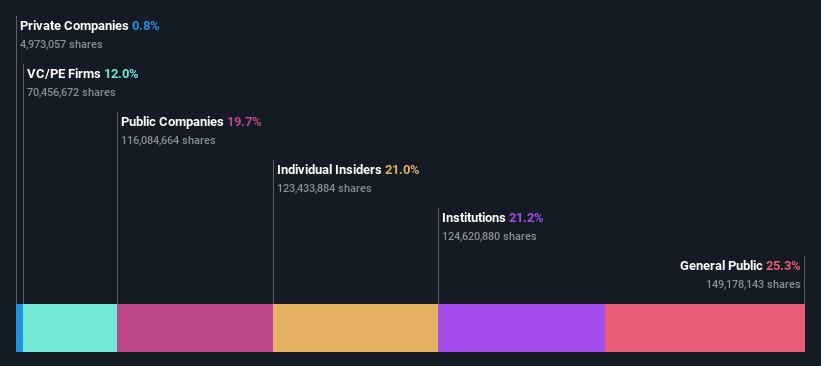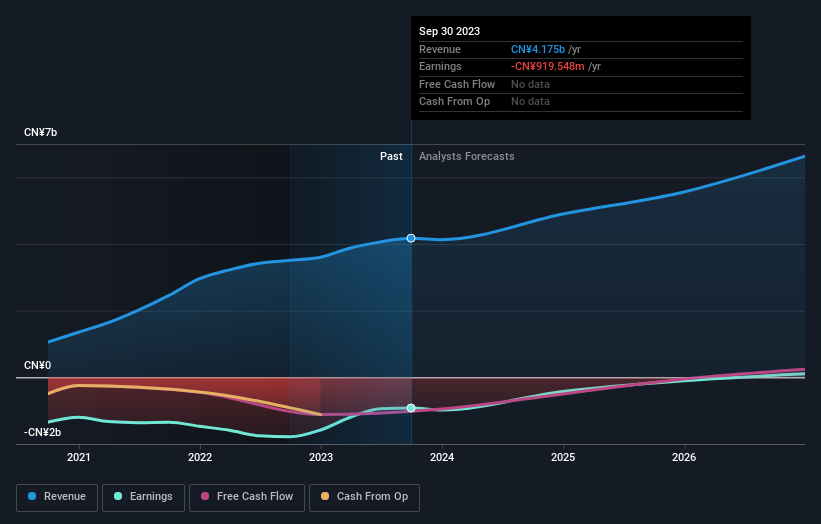Stock Analysis
Zhihu Inc.'s (NYSE:ZH) market cap dropped US$47m last week; individual investors who hold 25% were hit as were institutions

Key Insights
- Zhihu's significant retail investors ownership suggests that the key decisions are influenced by shareholders from the larger public
- The top 6 shareholders own 50% of the company
- 21% of Zhihu is held by insiders
If you want to know who really controls Zhihu Inc. (NYSE:ZH), then you'll have to look at the makeup of its share registry. The group holding the most number of shares in the company, around 25% to be precise, is retail investors. Put another way, the group faces the maximum upside potential (or downside risk).
While institutions, who own 21% shares weren’t spared from last week’s US$47m market cap drop, retail investors as a group suffered the maximum losses
Let's delve deeper into each type of owner of Zhihu, beginning with the chart below.
Check out our latest analysis for Zhihu

What Does The Institutional Ownership Tell Us About Zhihu?
Institutional investors commonly compare their own returns to the returns of a commonly followed index. So they generally do consider buying larger companies that are included in the relevant benchmark index.
We can see that Zhihu does have institutional investors; and they hold a good portion of the company's stock. This suggests some credibility amongst professional investors. But we can't rely on that fact alone since institutions make bad investments sometimes, just like everyone does. It is not uncommon to see a big share price drop if two large institutional investors try to sell out of a stock at the same time. So it is worth checking the past earnings trajectory of Zhihu, (below). Of course, keep in mind that there are other factors to consider, too.

Hedge funds don't have many shares in Zhihu. The company's largest shareholder is Tencent Holdings Limited, with ownership of 13%. With 13% and 6.9% of the shares outstanding respectively, Yuan Zhou and Qiming Weichuang Venture Capital Management (Shanghai) Company Limited are the second and third largest shareholders. Yuan Zhou, who is the second-largest shareholder, also happens to hold the title of Chief Executive Officer.
We also observed that the top 6 shareholders account for more than half of the share register, with a few smaller shareholders to balance the interests of the larger ones to a certain extent.
While it makes sense to study institutional ownership data for a company, it also makes sense to study analyst sentiments to know which way the wind is blowing. Quite a few analysts cover the stock, so you could look into forecast growth quite easily.
Insider Ownership Of Zhihu
While the precise definition of an insider can be subjective, almost everyone considers board members to be insiders. Company management run the business, but the CEO will answer to the board, even if he or she is a member of it.
Most consider insider ownership a positive because it can indicate the board is well aligned with other shareholders. However, on some occasions too much power is concentrated within this group.
Our information suggests that insiders maintain a significant holding in Zhihu Inc.. Insiders have a US$88m stake in this US$418m business. We would say this shows alignment with shareholders, but it is worth noting that the company is still quite small; some insiders may have founded the business. You can click here to see if those insiders have been buying or selling.
General Public Ownership
The general public-- including retail investors -- own 25% stake in the company, and hence can't easily be ignored. This size of ownership, while considerable, may not be enough to change company policy if the decision is not in sync with other large shareholders.
Private Equity Ownership
Private equity firms hold a 12% stake in Zhihu. This suggests they can be influential in key policy decisions. Some might like this, because private equity are sometimes activists who hold management accountable. But other times, private equity is selling out, having taking the company public.
Public Company Ownership
We can see that public companies hold 20% of the Zhihu shares on issue. This may be a strategic interest and the two companies may have related business interests. It could be that they have de-merged. This holding is probably worth investigating further.
Next Steps:
I find it very interesting to look at who exactly owns a company. But to truly gain insight, we need to consider other information, too.
Many find it useful to take an in depth look at how a company has performed in the past. You can access this detailed graph of past earnings, revenue and cash flow.
If you are like me, you may want to think about whether this company will grow or shrink. Luckily, you can check this free report showing analyst forecasts for its future.
NB: Figures in this article are calculated using data from the last twelve months, which refer to the 12-month period ending on the last date of the month the financial statement is dated. This may not be consistent with full year annual report figures.
Valuation is complex, but we're helping make it simple.
Find out whether Zhihu is potentially over or undervalued by checking out our comprehensive analysis, which includes fair value estimates, risks and warnings, dividends, insider transactions and financial health.
View the Free AnalysisHave feedback on this article? Concerned about the content? Get in touch with us directly. Alternatively, email editorial-team (at) simplywallst.com.
This article by Simply Wall St is general in nature. We provide commentary based on historical data and analyst forecasts only using an unbiased methodology and our articles are not intended to be financial advice. It does not constitute a recommendation to buy or sell any stock, and does not take account of your objectives, or your financial situation. We aim to bring you long-term focused analysis driven by fundamental data. Note that our analysis may not factor in the latest price-sensitive company announcements or qualitative material. Simply Wall St has no position in any stocks mentioned.
About NYSE:ZH
Zhihu
Zhihu Inc. operates an online content community in the People’s Republic of China.
Undervalued with adequate balance sheet.

